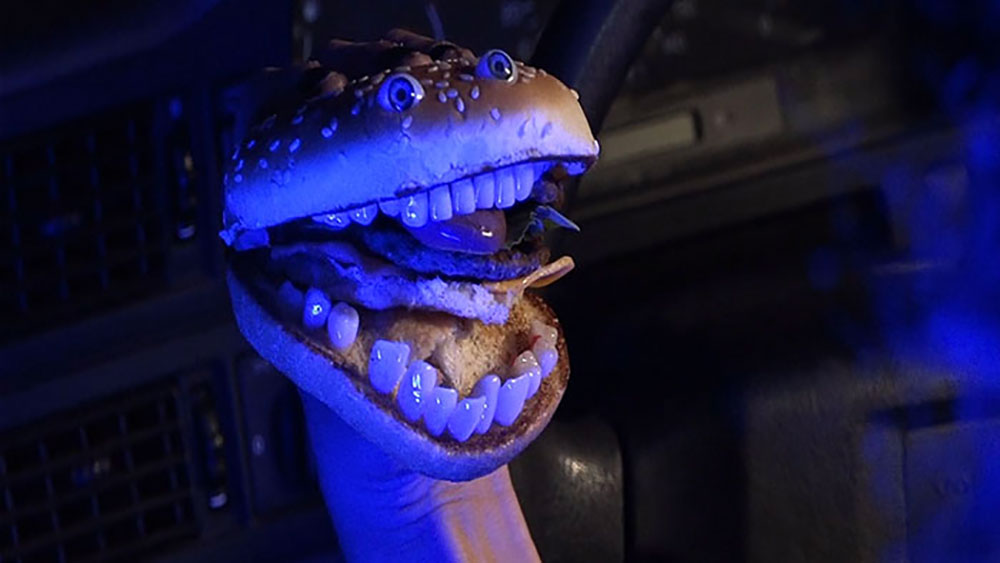In Rocko Zevenbergen’s feature debut, I Need You Dead! (2020), young punk DOOD (Estevan Muñoz) is content to live like a character in a Troma release. Sunglassed, with hair piled Robert Smith high and nails painted purple-black, he drives a car dubbed the “GIZ MOBILE” (for the Mogwai) to a house party full of the crusts of life. He cavorts among the bodies as the camera catches light beer dribbled from mouth corners and sweat barrelled out of other orifices. It’s a sequence of sh(l)ocking sincerity, full of punk-short shots and abrupt cuts that—along with DOOD’s crush-at-first sight on house-band bassist, Pal (Sidra Morgan-Montoya)—commingle to make the scene feel like a vision of a scuzzy utopia.
Even as DOOD takes a handful of psychedelic “dummy gummies” and spikes the film from basement-show slurry to bad trip anxiety, I Need You Dead! remains nearly exercise-like in its excitable unfurling of bargain basement techniques inherited from Don Coscarelli and Frank Henenlotter, with the latter’s Brain Damage (1988) leaking most liberally into Zevenbergen’s film. Tripping on gummies, DOOD encounters an entity known as The Creature (voiced by Tyler Anderson), a nasty talking head that leers at him like a tumorous Yorick, and whose cigarette-sodden voice and sleazo special effects confirm the film’s destiny as junk drawer oddity—a no-budget devotional to the slapdash ethos of punk rock and indie grime.
Initially dismissed by DOOD as a druggy hallucination, the film reveals The Creature to be a psychic manifestation of both his artistic inspirations and swings toward depression, and a Basket Case (1982) ego/id narrative ruptures the party-in-progress. And then the film cracks open, revealing a meta-narrative about a film in progress also called I Need You Dead! and its aspiring and depressed director, played by Zevenbergen himself. It’s tempting to mourn the rough energy of the film’s early sequences for this device of self-scrutiny, but by affectionately paying tribute to his cinematic forebears and then subsuming any easy genre fix, Zevenbergen authors a genuinely provocative move. He asks a question that eludes many filmmakers: why are you making the movie you’re making? It’s clear to the spectator—as it is to the beleaguered crew working on the film-within-the-film—that Zevenbergen loves this sleazy punk set of horror traditions and that he could easily reproduce them in (both versions) of I Need You Dead! But something in reproducing the tropes triggers a deep melancholy in the fictional director. As the fictional Zevenbergen doubles down on his depression–fueled vision, layers of analog filters pile up over the footage; this misplaced nostalgia parasitizes the image until it’s incomprehensible. Horrified at the prospect of cannibalizing its love for cinema and for people, the film authors an ending that’s horrific precisely because it depicts an artist who embraces solipsism over collaboration and a terminality of the image instead of turbulence. The former ends with a single author’s obsessions, while the latter echoes through past influences and current collaborators.
Self-awareness is no stranger to the horror ecosystem at present. Ti West continues to conceive of historical horror styles merely as textures to be slathered on films that see quotation as a kind of credit-accumulation and Ari Aster reduces monsters and monstrous urges to cheap one-way configurations, where the horror of horror cinema becomes a deadzone of pop-psyching grief, trauma, or self-loathing. These filmmakers’ cinemas of extraction stripmine aesthetics and psychology for the egoism of self-meaning, which is to say a personal brand. Few contemporary horror films display such simultaneous confidence and self-awareness in the creative act as I Need You Dead!, let alone entertain the ramifications of choosing empty aesthetic notion over actual affection. Zevenbergen never allows the beloved gore or grimecore to abate, but does so to forsake both anxiety and ecstasy for something fleshier: the bodily consequence of influence.
I Need You Dead! screens this evening, April 27th, at The Museum of the Moving Image as part of the series “Disreputable Cinema. Director Rocko Zevenbergen will be in attendance for a Q&A.



